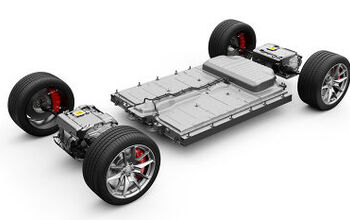Volkswagen Charged With Violating Vehicle Emission Rules in Canada

Volkswagen Group can’t seem to escape the rippling effects of its 2015 emissions cheating scandal. It wasn’t long ago that the automaker was subjected to surprise raids from German prosecutors, still investigating its regulatory malfeasance. On Monday, Canada threw its hat into the ring — charging the company with importing roughly 128,000 vehicles into the country in direct violation of its environmental laws.
Environment and Climate Change Canada (ECCC) announced VW is facing 60 counts of breaching the Canadian Environmental Protection Act by selling automobiles that fell outside the prescribed emission standards. Broken down, that includes 58 counts of contravening the law between 2008 and 2015 with two counts of providing misleading information.
A court hearing is scheduled for December 13th in the Ontario Court of Justice. Volkswagen said it intends to cooperate fully with the investigation by the ECCC. “At the hearing, the parties will submit for the Court’s consideration a proposed plea resolution and seek its approval,” a spokesperson explained.
From the ECCC:
In September 2015, Environment and Climate Change Canada launched an investigation into the importation into Canada of certain models of vehicles allegedly equipped with a prohibited “defeat device”, which in this case, is software that reduces the effectiveness of the emission control system during normal vehicle operation and use.
Environment and Climate Change Canada’s enforcement officers conducted a very comprehensive, thorough and meticulous investigation. Officers gathered an extraordinary quantity of evidence and information from foreign and domestic sources related to the suspected violations of federal environmental legislation. This involved collecting all relevant information possible, while working within different international legal environments. They then spent months poring over the information, analyzing and preparing the evidence for Public Prosecution Service of Canada review.
Thus far, VW has shelled out over $30 billion to settle fines, vehicle repairs, buybacks, and associated legal costs. Quite a bit of that went to the United States, which managed to push the automaker through the legal process more swiftly than other nations. But Germany continues to ramp up its investigation into the automaker, targeting specific staffers, and countless civil suits remain unsettled.
Those in Europe have been dragging, with VW trying to reframe the defeat devices as software-based emission fixes gone awry. However, Canada managed to snag two victories in 2017 when dual settlements were reached on behalf of customers who purchased affected 2.0 and 3.0-liter diesel units from Volkswagen, Audi, and Porsche. The company has since promised to do better, placing a strong focus on electrification.
[Image: Villorejo/Shutterstock]

A staunch consumer advocate tracking industry trends and regulation. Before joining TTAC, Matt spent a decade working for marketing and research firms based in NYC. Clients included several of the world’s largest automakers, global tire brands, and aftermarket part suppliers. Dissatisfied with the corporate world and resentful of having to wear suits everyday, he pivoted to writing about cars. Since then, that man has become an ardent supporter of the right-to-repair movement, been interviewed on the auto industry by national radio broadcasts, driven more rental cars than anyone ever should, participated in amateur rallying events, and received the requisite minimum training as sanctioned by the SCCA. Handy with a wrench, Matt grew up surrounded by Detroit auto workers and managed to get a pizza delivery job before he was legally eligible. He later found himself driving box trucks through Manhattan, guaranteeing future sympathy for actual truckers. He continues to conduct research pertaining to the automotive sector as an independent contractor and has since moved back to his native Michigan, closer to where the cars are born. A contrarian, Matt claims to prefer understeer — stating that front and all-wheel drive vehicles cater best to his driving style.
More by Matt Posky
Latest Car Reviews
Read moreLatest Product Reviews
Read moreRecent Comments
- 28-Cars-Later So Honda are you serious again or will the lame continue?
- Fred I had a 2009 S-line mine was chipped but otherwise stock. I still say it was the best "new" car I ever had. I wanted to get the new A3, but it was too expensive, didn't come with a hatch and no manual.
- 3-On-The-Tree If Your buying a truck like that your not worried about MPG.
- W Conrad I'd gladly get an EV, but I can't even afford anything close to a new car right now. No doubt if EV's get more affordable more people will be buying them. It is a shame so many are stuck in their old ways with ICE vehicles. I realize EV's still have some use cases that don't work, but for many people they would work just fine with a slightly altered mindset.
- Master Baiter There are plenty of affordable EVs--in China where they make all the batteries. Tesla is the only auto maker with a reasonably coherent strategy involving manufacturing their own cells in the United States. Tesla's problem now is I think they've run out of customers willing to put up with their goofy ergonomics to have a nice drive train.


































Comments
Join the conversation
"Environment and Climate Change Canada’s enforcement officers conducted a very comprehensive, thorough and meticulous investigation." Sure, but what took 4+ years?
Technically it's advanced, but with the front styling they've doubled (okay, tripled, if you include the Silverado HD) down on ugly. The IRS is a completely different setup from what Ford uses on the Expedition, so I wonder what advantages their setup offers over the Expedition. Less camber change maybe? One of things that keeps me away from GM products ids the Chinesium content, and the cheap parts. Speaking of Chinesium, where's DeadWeight?